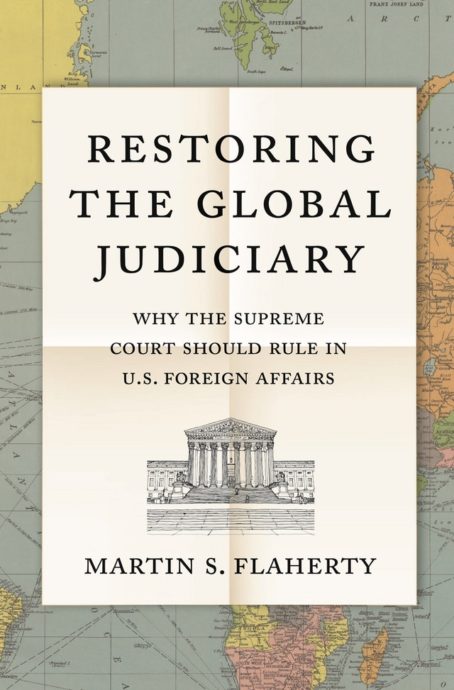We are settling into a lasting pattern of both parties in Congress assuming it is the courts’ job, not their own, to protect their institutional power.
The Progressive Jurist's Burden
Before the iniquities of Trump—and the sinister 1930s associations of his “America First” slogan—academic commentators were focused on building up “global governance.” Actually, no, come to think of it, that was several fads before Trump. Before Trump, professors were still preoccupied with issues left over from George Bush’s “unlawful” war in Iraq and his “dangerously open-ended” “war on terror.” The “global governance” boom was in the Clinton era, in the immediate aftermath of the Cold War. President Obama was not that much into it. He was not willing to fight for a treaty on climate change or any other international convention.
Distant historians may be better equipped to sort out the political premises of President Trump’s rhetoric, with its nearly obsessive invocation of the word “sovereignty” (along with enthusiastic embrace of “national self-interest”). Has he been principally playing off lingering disdain for “globalist” rhetoric from two decades earlier—or more recent resentment of “neo-con adventures” in the Middle East?
There is no doubt about where to situate Martin Flaherty’s Restoring the Global Judiciary. It is almost uncanny how complacently it picks up the broken threads of legal argument from a quarter century ago. It reads as if a legal scholar had been frozen in some cryogenic lab in that era (when Francis Fukuyama was topping the best seller list), then thawed out in 2018 and sent back to his office to finish his manuscript. Flaherty, a professor at Fordham Law School, even has the polite, earnest tone of legal argument from the early Clinton years, pitched to readers who would, of course, share the author’s concern for engaging global challenges (as with climate change) and protecting shared global values (as with human rights).
It’s the charm of Restoring the Global Judiciary. Amidst the rancor of the Trump era, an author who writes with this mild tone is more startling than one who goes around with a monocle in his eye and spats on his shoes. But it may prove a precursor to debates that will revive in a Warren Administration, when new appointees on the federal bench venture to revive to the “globalist” vision. Perhaps we should attend to the arguments now, when we can do so politely.
The main argument is well summarized by the subtitle. Flaherty wants the U.S. Supreme Court (and other federal courts) to enforce international law standards against backward American states and localities, while also invoking international law (and an internationalist reading of our own Constitution) to restrain foreign policy initiatives of U.S. presidents. He argues, at much length and detail, that this larger role would be more consistent with what the Founders intended. It would, he says, restore a judicial component to checks and balances in foreign affairs.
Flaherty does have some history on his side. So it is not altogether fanciful for him to invite constitutional “originalists” to sign up for this project (especially given the range of approaches now calling themselves “originalist”). Early Court rulings and commentaries did give respectful notice to the customary “law of nations” and to the status of treaties as “supreme law of the land.” It was only in the 20th Century (as Flaherty documents) that judicial rulings marginalized the role of courts in foreign affairs, with doctrines such as deference to executive interpretation of treaties and a presumption against giving direct effect to treaties (and to customary international law) in U.S. courts.
But the argument proceeds at a very high level of abstraction. Before the Civil War, when federal authority was limited and precarious, it might have seemed especially attractive for nationalists to emphasize a federal judicial role in guarding America’s international legal commitments. And in that era, it was important for a relatively weak American union to avoid offending foreign states. That’s not where we are now.
The most important difference is that “international law” now has vastly larger scope than it did in the decades after our Founding. Flaherty acknowledges that post-World War II human rights conventions—purporting to regulate how governments treat their own citizens—have vastly broadened the reach of international law. He gives less notice to international environmental treaties, specialized conventions on permissible weapons or war tactics, international trade agreements, etc. The fact that John Marshall offered confident decisions on the rights of foreign ships in American ports—the mainstay of his “international law” jurisprudence—doesn’t mean he’d be quick to apply international regulatory standards today (and without regard to advice from the relevant executive specialists).
Flaherty’s confidence would be more persuasive if he were more searching in his survey of relevant issues. He emphasizes the guidance U.S. courts could draw from international conventions and rulings of foreign courts on human rights issues. He goes so far as to argue that our courts should try to accommodate interpretations of our own Bill of Rights to accord with international trends. That is, he concedes, “a bold, if not audacious claim”—but he offers this reassurance: “Dissatisfaction at the polls could always lead to the election of a president and Senate who approved a less internationally inclined judiciary.”
You can call this visionary, but Flaherty does not seem to imagine there could be any down side to such coordination. Perhaps he’s taken a hint from the Court. When the Court invoked foreign practice to justify a further limit on capital punishment, Justice Scalia’s dissent (in Roper v. Simmons, 2005) pointed out that the Court only let itself be inspired by foreign practice it agreed with. Liberal justices did not acknowledge the even slight uneasiness about U.S. abortion law (largely crafted by the justices), though it is more permissive than the law in any other Western country, while U.S. constitutional standards for government accommodation to religion are far more restrictive than in most other Western countries. Flaherty never acknowledges that standardizing human rights norms might threaten some precedents cherished by the ACLU.
The globalization program might seem even more challenging in other fields. There have been dozens of international arbitration rulings in recent decades, holding that host states must compensate foreign investors for regulatory interventions so onerous that they constitute arbitrary “taking” of private property. Some commentators call this an emerging “customary international economic law.” How would Flaherty feel if U.S. courts invoked these precedents to beef up the Fifth Amendment prohibition against “taking” private property without “just compensation”? Evidently, that’s not what he has in mind. He seems to take for granted that “international” means more in keeping with what American liberals would prefer.
But the world is a bigger place than liberal advocates notice. For all its urgings to embrace international standards, this book makes remarkably little effort to analyze what other nations actually do, even when it comes to their stance toward international law and international tribunals. So, for example-, Flaherty scolds the U.S. Supreme Court for curtailing the jurisdiction of federal courts over human rights abuses committed outside our territory (notably in Kiobel v. Royal Dutch Petroleum, 2013). He does not notice that European countries have also restricted civil liability in such situations and declined to launch criminal prosecutions over extra-territorial rights abuses, except where the perpetrator or the victim had some close connection to the charging state.
Similarly, Flaherty devotes many pages to criticizing the Supreme Court’s ruling in Medellin v. Texas (2008), holding that Texas state courts could properly disregard a treaty interpretation set down by the International Court of Justice. He does not acknowledge the part of Chief Justice Roberts’ opinion which documents that other nations also generally decline to treat rulings of international tribunals as immediately binding on their own courts. The European Union frequently defies—or delays implementing—adverse rulings of the Appellate Body of the World Trade Organization. The Court of Justice of the European Union disclaims any obligation to follow rulings of the European Court of Human Rights, even though the EU is party to the human rights convention under which the human rights court operates. In the past few years, Russia and China have both defied rulings of the International Tribunal for the Law of the Sea.
When Flaherty argues for a “global judiciary,” he means a better American judiciary to speak—when convenient—in the name of “the world community.” Tellingly, the book never once inquires whether other nations would really like to see U.S. courts extend their reach more widely than they now do and then tell the world that’s international law. Somehow, appeals to global thinking here don’t go along with efforts to enlarge our imagination. It’s as if Flaherty imagines that American voters are the only obstacle to implementing a comfortable, edifying, reasonable global consensus on all the important things.



